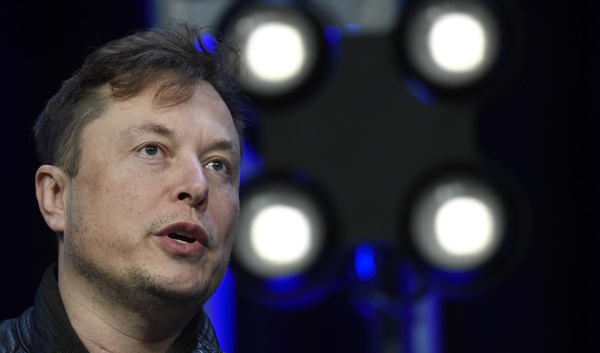Twitter suspends several journalists who shared information about Musk's jet
Go Deeper.
Create an account or log in to save stories.
Like this?
Thanks for liking this story! We have added it to a list of your favorite stories.

Press freedom advocates on Thursday criticized Twitter owner Elon Musk, who has suspended the accounts of several high-profile journalists who cover the billionaire and his chaotic leadership of the social media site.
Musk took the highly unusual move of booting journalists from Twitter following a sudden change in policy about accounts that share the travels of private jets using publicly available information.
Musk tweeted that those who violate Twitter's new policy will be suspended for 7 days.
Many of the journalists who were suspended Thursday night had tweeted or written about the rift between Musk and the jet-tracking account.
Turn Up Your Support
MPR News helps you turn down the noise and build shared understanding. Turn up your support for this public resource and keep trusted journalism accessible to all.
Reporters whose accounts were suspended include Donie O'Sullivan of CNN; Ryan Mac of the New York Times; Drew Harwell of the Washington Post; Micah Lee of the Intercept; and journalist Aaron Rupar.
In a post on Substack, Rupar wrote that he is unsure why he was suspended. He said he did tweet on Wednesday a link to a Facebook page for the jet-tracking account.
"Perhaps that did it," Rupar wrote. "But I still don't know what policy that could've possibly violated."
Jameel Jaffer, executive director of the Knight First Amendment Institute at Columbia University, called Musk's move disturbing.
"Musk suspending journalists' accounts is petty and vindictive and absolutely disgraceful—and especially so because Musk has styled himself, however absurdly, as a champion of free speech," Jaffer said in a statement.
Nora Benavidez, senior counsel at the advocacy group Free Press, echoed Jaffer's remarks, saying suspending journalists based seemingly on personal animus "sets a dangerous precedent."
"Musk already has a long track record of trying to silence people he dislikes or speech that is critical of him," Benavidez said, noting that the suspension of journalists "endangers the broader public's ability to know what is happening inside Twitter."
In a statement to NPR, Twitter's head of Trust & Safety Ella Irwin said sharing people's real-time location information on Twitter is now a violation of its policies.
"Without commenting on any specific user accounts, I can confirm that we will suspend any accounts that violate our privacy policies and put other users at risk," Irwin said. "We don't make exceptions to this policy for journalists or any other accounts."
Shortly after the suspensions, Musk said on Twitter that the moves were not in retaliation for critical coverage.
"Criticizing me all day long is totally fine, but doxxing my real-time location and endangering my family is not," Musk tweeted.
Suspensions follow Musk's 'crazy stalker' allegations
On Wednesday, Musk suspended accounts that track the movement of private jets used by billionaires, government officials and others, including Musk's own plane, claiming the accounts amounted to "doxxing," or the sharing of personal information to encourage harassers.
Musk also claimed that one account that operated under the handle @ElonJet, run by a 20-year-old University of Florida student, was used by a "crazy stalker" in Los Angeles to follow a car carrying one of Musk's children.
In addition to the journalists, a Twitter account for Mastodon, a social media site seen as an alternative to Twitter, was also suspended on Thursday. Mastodon was among the sites the creator of the ElonJet account went following Musk's crackdown.
Musk, a self-professed "free speech absolutist," has reinstated droves of accounts that had been pushed off Twitter, including the account of former President Trump and the accounts of many far-right conspiracists who had previously been banned.
Musk has also used his new platform to promote the so-called Twitter Files, a tranche of internal documents that he claimed to expose a censorship scandal, but in fact, revealed messy internal debates about thorny subjects more than anything else.
Copyright 2022 NPR. To see more, visit https://www.npr.org.



